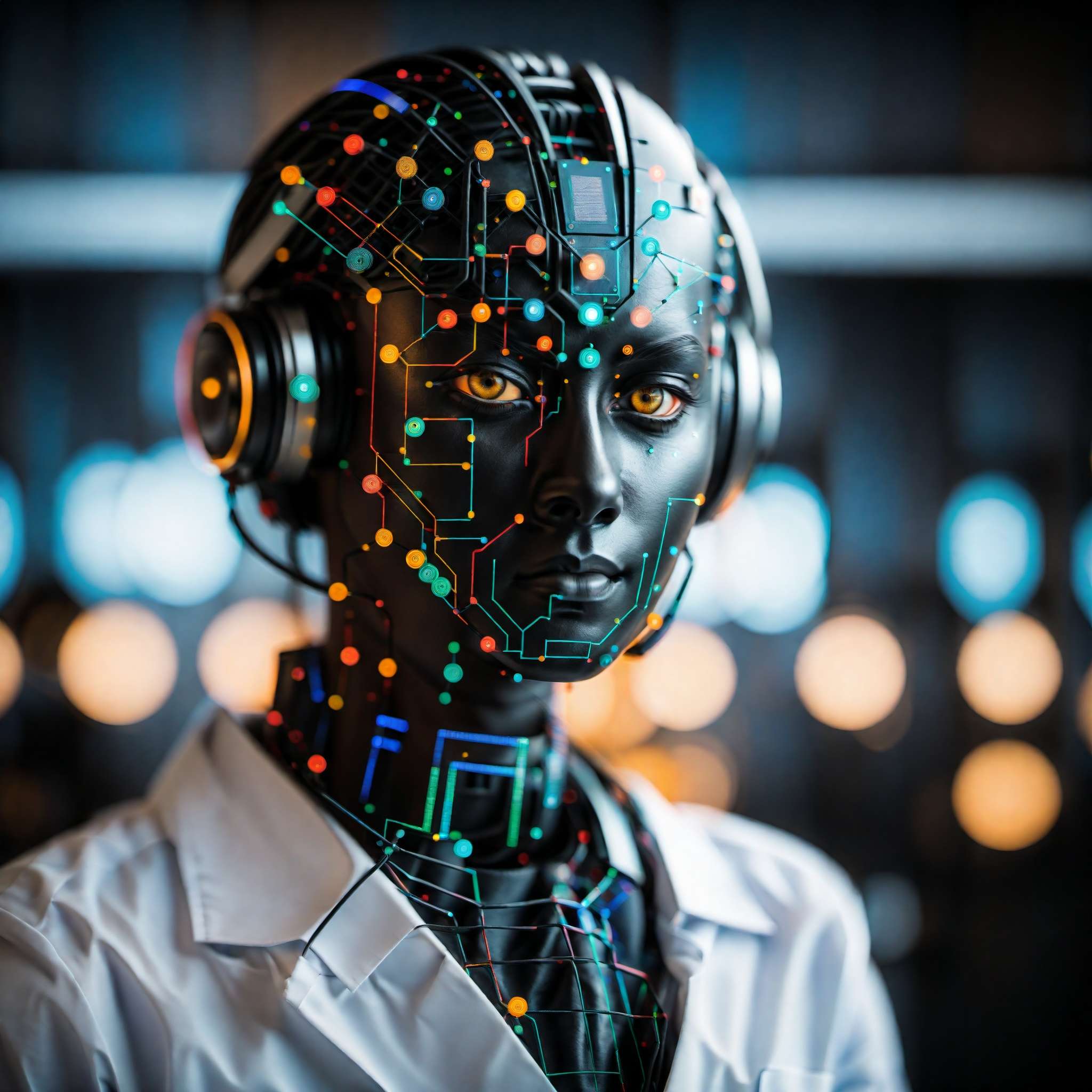Zombie Bunny is Reader-supported and may earn an affiliate commission through links on our site.

The AI Revolution: How to Future Proof Your Career in Technology
Stay ahead of the curve in the advent of AI with these tech careers. #AIRevolution #FutureProofCareers
As we stand on the brink of the AI revolution, it’s crucial for tech professionals to embrace AI and commit to a journey of continuous learning. This blog explores the pervasive influence of AI, reshaping industries from healthcare to finance to education. It delves into the ethical, societal, and economic implications of AI, highlighting the importance of staying updated with the rapidly evolving field. From understanding AI principles and applications to learning new skills and staying abreast of emerging trends, the blog underscores the importance of continuous learning in future-proofing your tech career. It’s not just about securing your career, it’s about contributing to a future where AI is used to solve complex problems, improve lives, and create a more equitable and sustainable world. Embrace AI, commit to continuous learning, and be a part of shaping the future of technology.
Introduction: Setting the Scene for AI

© Copyright , ZombieBunny.Org
The current status of AI in the tech world
Artificial intelligence (AI) is no longer a sci-fi concept relegated to the realm of the distant future. It has firmly planted its roots in today’s tech world, redefining the way we live, work, and interact with technology. From smart home devices that learn our daily routines to sophisticated algorithms that power search engines and social media platforms, AI is everywhere.
The current status of AI in the tech world can be best described as a period of rapid expansion and integration. Tech giants like Google, Amazon, and Microsoft are heavily investing in AI, pushing the boundaries of what’s possible with machine learning and deep learning. These investments are resulting in innovative AI-powered products and services that are transforming various industries, including healthcare, finance, and retail. Furthermore, AI’s influence is not confined to the corporate world; it’s also making a significant impact in areas such as scientific research, environmental conservation, and even arts and entertainment.
Advancements in AI are happening at an unprecedented pace, and this trend shows no signs of slowing down. As we stand on the cusp of the AI revolution, it’s essential for tech professionals to understand the current landscape of AI, recognize its potential for future growth, and adapt to the evolving tech world. The advent of AI presents both challenges and opportunities, but one thing is clear: AI is here to stay, and it’s reshaping the tech world as we know it.
An overview of the AI revolution
The AI revolution refers to the significant shift in technology and business practices resulting from the widespread adoption and integration of artificial intelligence. For decades, AI remained a theoretical concept, but it’s now being actualized in a multitude of ways, fueling a revolution in the tech world and beyond.
At the heart of this revolution lies machine learning and deep learning, subsets of AI that enable computers to learn from data, make predictions, and improve their performance over time without being explicitly programmed. This technological breakthrough has allowed for the development of self-driving cars, speech recognition systems, personalized recommendations, and more.
The AI revolution is not isolated to specific sectors; it’s a global phenomenon impacting every industry. From healthcare, where AI algorithms are used for disease detection, to finance, where robo-advisors are revolutionizing wealth management, the impact of AI is far-reaching. It’s also shaping our personal lives, with virtual assistants like Siri and Alexa becoming household names.
However, the AI revolution isn’t just about technological advancements. It’s also a paradigm shift in the way businesses operate and how we approach problem-solving. Companies are harnessing the power of AI to drive efficiency, innovate, and gain a competitive edge. Meanwhile, AI is opening up new avenues for creativity and innovation, challenging us to reimagine what’s possible. As we navigate this revolution, it’s crucial to stay informed, upskill, and adapt to leverage the opportunities AI presents.
The potential impact of AI on jobs and careers in technology
The rise of AI is dramatically influencing jobs and careers in the tech industry. As AI technologies continue to evolve and permeate various sectors, they’re creating a seismic shift in the skills that employers seek. For tech professionals, this means that understanding and being able to work with AI is fast becoming a necessary skill.
AI’s impact on the tech job market is twofold. On one hand, it’s creating a demand for new roles such as AI specialists, data scientists, machine learning engineers, and AI ethicists. These roles require a deep understanding of AI and related technologies, and offer exciting opportunities for those with the right skills.
On the other hand, AI is automating certain tasks, particularly those that are repetitive or require little human judgment. While this can lead to job displacement in some areas, it also opens up possibilities for new roles focused on managing and overseeing AI systems.
However, it’s not just about technical skills. As AI continues to transform the tech industry, there’s a growing need for professionals who can understand and navigate the ethical, legal, and societal implications of AI use.
In essence, the AI revolution is reshaping the tech job market, creating both challenges and opportunities. For tech professionals, this means that staying current with AI trends, continuously upskilling, and adapting to the changing landscape are crucial to future proofing their careers in this exciting new era of technology.
The Evolution of AI: Past Present and Future

© Copyright , ZombieBunny.Org
The history of AI and its evolution
The journey of artificial intelligence dates back to the mid-20th century, when the term “AI” was first coined at the Dartmouth Conference in 1956. The pioneers of AI harbored the vision of creating machines that could mimic human intelligence. Early AI research focused on problem-solving and symbolic methods, leading to the development of systems capable of basic tasks such as checkers and solving word problems.
The 1970s and 80s marked the era of “AI Winter,” a period of reduced funding and interest in AI research due to high expectations meeting technical limitations. However, the emergence of machine learning in the 1990s breathed new life into the field. This shift from rule-based systems to models that can learn from data set the stage for the current AI revolution.
With the advent of the internet and the digitization of information, vast amounts of data became available, propelling AI forward. The 21st century has seen significant advancements in AI, with technologies such as voice recognition, image recognition, and natural language processing becoming commonplace.
Today, AI is not just about replicating human intelligence but augmenting it. The focus has shifted from creating systems that can think like humans to systems that can learn from data and make decisions. This evolution of AI, from a theoretical concept to a transformative technology, is a testament to the relentless pursuit of innovation and understanding in the field. As we look forward to the future of AI, it’s important to appreciate the journey that has brought us here.
Key milestones that have marked the AI revolution
The AI revolution has been marked by several key milestones that have propelled the field from an experimental science to a transformative technology. The first landmark event occurred in 1956 with the Dartmouth workshop, which coined the term “artificial intelligence” and sparked the AI research field.
In the 1990s, IBM’s Deep Blue beating world chess champion Garry Kasparov marked a significant milestone, demonstrating that AI could surpass human intellect in specific tasks. This event underscored the potential of AI and fueled further interest in the field.
The advent of the internet and the explosion of digital data in the late 90s and early 2000s set the stage for the next phase of the AI revolution. The availability of vast amounts of data allowed for the development and refinement of machine learning algorithms, leading to significant advancements in AI capabilities.
In the 2010s, advancements in deep learning and neural networks led to another major milestone with Google’s AlphaGo defeating the world champion in the complex game of Go. This achievement highlighted the power of AI to tackle problems of immense complexity.
These milestones have been instrumental in shaping the AI landscape as we know it today. Each breakthrough has not only advanced the field technically but also expanded our understanding of what’s possible with AI. As we continue to push the boundaries of AI, understanding these key milestones can provide valuable insights into the trajectory of this revolutionary technology.
Predictions for the future of AI
As we look towards the future, AI is set to continue its transformative trajectory, reshaping industries, and changing the way we live and work. One of the key predictions for the future of AI is the rise of autonomous systems. From self-driving cars to drones, AI will play a pivotal role in making autonomous systems a reality, significantly impacting transportation, logistics, and even urban planning.
Another prediction revolves around AI’s role in healthcare. AI has the potential to revolutionize healthcare, from predictive diagnostics to personalized medicine. AI algorithms can analyze vast amounts of data to predict health risks, suggest preventative measures, and even assist in drug discovery.
AI is also set to redefine the way businesses operate. Companies will increasingly rely on AI for decision-making, customer service, and operations. AI will enable businesses to automate tasks, analyze data for insights, and deliver personalized experiences, driving efficiency and innovation.
Furthermore, AI will continue to evolve, with advancements in areas such as reinforcement learning, generative AI, and AI transparency. As AI becomes more sophisticated, we can expect to see more human-like AI, capable of understanding and responding to complex situations.
While these predictions paint an exciting picture of the future, it’s important to note that they also raise significant ethical and societal considerations. As we navigate the future of AI, it’s critical to ensure that these technologies are developed and used responsibly, balancing innovation with ethical considerations.
Understanding AI: Going Beyond the Buzzword

© Copyright , ZombieBunny.Org
Breaking down what AI really is
Artificial Intelligence (AI) is a branch of computer science that aims to create systems capable of performing tasks that would normally require human intelligence. These tasks include learning from experience, understanding natural language, recognizing patterns, solving problems, and making decisions. AI is not a single technology, but rather a collection of methodologies and tools that enable machines to mimic human behavior.
At the core of AI is the concept of machine learning, where computers are trained to learn from data and improve their performance over time without being explicitly programmed. This learning process can be supervised, where the machine learns from labeled data, unsupervised, where it discovers patterns in unlabeled data, or reinforced, where it learns through trial and error.
Deep learning, a subset of machine learning, takes this concept further by using artificial neural networks to model and understand complex patterns. These neural networks are designed to mimic the human brain’s structure and function, enabling machines to process data in a more human-like way.
AI is not just about automation or replacing human tasks. It’s about augmenting human capabilities, providing valuable insights, and enabling us to make more informed decisions. From predictive analytics to natural language processing, AI is transforming the way we interact with technology, offering immense potential for innovation and growth. Understanding what AI truly is, beyond the buzzword, is the first step towards leveraging its potential and navigating the AI revolution.
Different types of AI and their functionalities
Artificial Intelligence can be broadly classified into three types: Narrow AI, General AI, and Superintelligent AI, each with its unique functionalities.
Narrow AI, also known as Weak AI, is the most common form of AI that we encounter in our daily lives. It is designed to perform a specific task, such as voice recognition or image recognition. Examples include Google’s search algorithms, Amazon’s recommendation system, and Apple’s Siri. Despite being termed “weak”, these systems have significantly transformed our interactions with technology and have wide-ranging applications across industries.
General AI, or Strong AI, refers to systems that possess the ability to understand, learn, adapt, and implement knowledge across a broad range of tasks at the level of a human being. While this type of AI is prevalent in science fiction, it remains largely theoretical in the real world, with research and development still in progress.
Superintelligent AI is a future concept where AI surpasses human intelligence in virtually all economically valuable work. This form of AI would not only understand and learn tasks but also have the ability to outperform humans in most economically valuable work. While intriguing, superintelligent AI also raises significant ethical and safety concerns.
Understanding these different types of AI and their functionalities is crucial for tech professionals. It not only assists in comprehending the current landscape of AI but also provides insights into its potential future developments and challenges.
The role of data in AI
Data plays a central role in the functionality of artificial intelligence. AI systems, particularly those based on machine learning, rely heavily on data to learn, adapt, and make decisions. In fact, the explosion of digital data in recent years has been a key driver in the advancement of AI technologies.
In the context of machine learning, data is used to train models. These models learn patterns and relationships within the data and use this knowledge to make predictions or decisions without being explicitly programmed to perform the task. The quality and quantity of the data used can significantly impact the performance of the AI system. High-quality, diverse data sets can lead to more accurate and unbiased AI models.
Furthermore, data is not only crucial in the training phase but also in the testing and validation of AI models. Testing allows for the assessment of the model’s performance and the identification of any issues, such as overfitting or bias.
Data also plays a role in the continuous improvement of AI systems. As more data is collected, the AI system can continue to learn and adapt, improving its performance over time. This ability to learn from data is what sets AI apart from traditional software systems.
In essence, data is the lifeblood of AI. Understanding its role and importance is a crucial aspect of working with AI and navigating the AI revolution.
AI in Action: Real World Applications

© Copyright , ZombieBunny.Org
Examples of how AI is being used in different industries
Artificial intelligence is making waves across various industries, transforming operations, enhancing efficiencies, and creating new opportunities for innovation. Here are a few examples of how AI is being utilized in different sectors.
In healthcare, AI is revolutionizing diagnostics and treatment plans. For instance, machine learning algorithms are being used to analyze medical images and detect early signs of diseases like cancer, often with a higher degree of accuracy than human doctors. AI is also being used to predict patient risks and personalize treatment plans.
In the financial sector, AI is powering robo-advisors, automating trading systems, and enhancing fraud detection. It’s also being used to analyze vast amounts of financial data to make investment predictions and inform business decisions.
Retailers are leveraging AI to optimize inventory management, personalize customer experiences, and forecast sales. AI-powered chatbots are providing customer service, while machine learning algorithms are offering personalized product recommendations based on customer behavior.
The manufacturing industry is using AI to streamline operations, improve quality control, and enhance predictive maintenance. AI algorithms analyze data from machines to predict failures before they happen, reducing downtime and costs.
In the education sector, AI is personalizing learning experiences and providing adaptive learning pathways. It’s also automating administrative tasks like grading and scheduling, freeing up time for educators.
These examples illustrate the transformative potential of AI across industries. By harnessing the power of AI, businesses can drive efficiency, innovation, and growth, positioning themselves for success in the AI-driven future.
The benefits and challenges of AI implementations
Implementing artificial intelligence can offer a multitude of benefits, but it’s not without its challenges. Understanding both the advantages and hurdles of AI implementation is crucial for businesses to navigate the AI revolution effectively.
Among the most significant benefits of AI is its potential to increase efficiency and productivity. By automating repetitive tasks, AI frees up time for employees to focus on more strategic, high-value tasks. Additionally, AI can analyze large volumes of data rapidly and accurately, providing valuable insights that can inform decision-making and strategy.
AI can also enhance customer experiences. Through personalization and predictive analytics, AI can help businesses understand customer behavior and preferences, leading to improved customer service and satisfaction.
Despite these benefits, implementing AI also presents challenges. One of the main hurdles is data management. AI systems require high-quality, diverse data to function effectively, but collecting, managing, and securing this data can be complex.
Another challenge is the skills gap. Implementing and managing AI systems require specific skills and knowledge, which many organizations may lack. This underscores the importance of continuous learning and upskilling in the AI age.
Ethical considerations also pose a challenge. Issues around data privacy, transparency, and bias in AI systems need careful consideration and management.
In conclusion, while AI offers significant potential benefits, its implementation requires careful planning and management. Businesses need to understand and address these challenges to fully leverage the opportunities that AI presents.
Case studies of successful AI applications
Artificial intelligence has been successfully implemented across various sectors, driving innovation and growth. Here are a couple of case studies that illustrate the potential of AI applications.
In healthcare, Google’s DeepMind Health project stands out. The AI system was trained to detect over 50 eye diseases as accurately as world-leading expert doctors. It analyses 3D scans of the eye, identifies signs of disease, and suggests a referral for further medical examination when needed. This is a prime example of how AI can augment human expertise and help in early disease detection, potentially saving lives.
In retail, Amazon’s use of AI for personalized recommendations is a flagship example. Amazon’s recommendation engine uses machine learning algorithms to analyze a customer’s purchase history, items in their shopping cart, items they’ve rated and liked, and what other customers have viewed and purchased. This personalized approach has significantly boosted their sales, making it a successful application of AI in e-commerce.
Another notable example is in the automotive industry with Tesla’s self-driving cars. Tesla’s Autopilot system uses AI to analyze real-time data from the vehicle’s sensors, allowing the car to detect traffic, change lanes, park, and even navigate autonomously under certain conditions.
These case studies highlight how AI can be leveraged for success across different sectors. They also illustrate the transformative potential of AI, offering valuable insights for businesses and professionals navigating the AI revolution.
The Impact of AI on the Tech Job Market

© Copyright , ZombieBunny.Org
How AI is shaping the tech job market
Artificial Intelligence is undeniably shaping the tech job market, influencing the demand for certain skills and creating new roles. One of the most significant effects of AI’s rise is the creation of new job titles and roles. These include data scientists, AI ethicists, machine learning engineers, and AI specialists, signaling the need for professionals with deep understanding of AI and related technologies.
However, AI is not just creating jobs; it’s also transforming existing roles. Many tech positions now require some knowledge of AI and machine learning, even if they’re not directly involved in building AI systems. For example, software developers are increasingly expected to understand how to integrate AI capabilities into applications.
AI is also automating certain tasks, particularly those that are repetitive or require little human judgment. This has the potential to displace some jobs, but it also frees up professionals to focus on more complex, strategic tasks and can lead to the creation of new roles in managing and overseeing AI systems.
Moreover, as AI continues to evolve, there’s a growing demand for professionals who can understand and navigate the ethical, legal, and societal implications of AI use.
In essence, AI is significantly reshaping the tech job market, creating both opportunities and challenges. For those in the tech industry, adapting to these changes and continuously upskilling are critical to staying relevant and future-proofing their careers.
New career opportunities arising from AI
The advent of Artificial Intelligence has given rise to an array of new career opportunities within the tech industry. These roles reflect the growing influence and complexity of AI technologies.
One of the most prominent new roles is that of the AI Specialist, a professional who designs and implements AI models. This role requires a strong understanding of machine learning algorithms, programming skills, and the ability to transform business problems into AI solutions.
Data Scientists are also in high demand. They are responsible for analyzing and interpreting complex digital data to assist companies in their decision-making processes. The role requires a blend of statistical, programming, and machine learning skills, along with the ability to communicate complex findings in a digestible manner.
AI Ethicist is another emerging career path. This role involves evaluating AI systems, ensuring they are developed and used in a manner that is ethically sound, fair, and transparent. AI Ethicists must navigate the complex landscape of AI ethics, balancing the benefits of AI with potential societal risks.
Machine Learning Engineers, who design and build machine learning systems, are also in high demand. These professionals need a solid understanding of computer science fundamentals, programming, and machine learning algorithms.
The rise of AI has also triggered demand for roles that didn’t exist a few years ago, such as AI Translator, who bridges the gap between technical AI teams and non-technical stakeholders. These new career opportunities highlight the transformative impact of AI on the tech job market and underline the importance of continuous learning in this evolving landscape.
Skills required for AI-related jobs
As AI continues to reshape the tech job market, there’s a growing demand for a new set of skills. Understanding and acquiring these skills is crucial for anyone looking to future-proof their career in the AI-driven tech industry.
One of the primary skills required for AI-related jobs is a solid understanding of machine learning algorithms and deep learning frameworks. This involves knowledge of programming languages like Python, R, or Java, as well as proficiency in machine learning libraries such as TensorFlow or PyTorch.
Data skills are also critical. This includes the ability to manipulate large data sets, understand data structures, and use databases efficiently. Familiarity with data visualization tools and techniques is also beneficial.
Statistical skills are crucial for interpreting data and making informed decisions based on machine learning models. This includes understanding probability, statistical tests, and distributions.
Another key skill is problem-solving. Professionals in AI-related roles need to be able to translate complex business problems into AI solutions, requiring a strong understanding of the organization’s goals and the ability to think critically.
In addition to these technical skills, soft skills are also important. Good communication skills are crucial for explaining complex AI concepts to non-technical stakeholders. Creativity is also valuable, as AI often involves coming up with innovative solutions to problems.
As AI continues to evolve, so too will the skills required to work with it. Continuous learning and adaptability are thus critical for anyone looking to build a career in the AI field.
Preparing for an AI-Driven Future: Essential Skills and Knowledge

© Copyright , ZombieBunny.Org
Key AI concepts to understand
Navigating an AI-driven future requires a solid understanding of key AI concepts. Here are a few essential ones to grasp.
Machine Learning (ML) is a subset of AI that involves the development of algorithms that allow computers to learn from data. Understanding how these algorithms work, and the differences between supervised, unsupervised, and reinforcement learning, is critical.
Deep Learning, a subset of machine learning, uses artificial neural networks to model and understand complex patterns. Understanding how these networks function and how they mimic the structure of the human brain is vital.
Natural Language Processing (NLP) is another important concept. It involves enabling machines to understand and respond to human language. This is the technology behind voice assistants like Siri and Alexa.
Understanding the concept of Neural Networks, which are computational models based on the human brain, is also essential. These networks are designed to recognize patterns and interpret sensory data, forming the foundation for deep learning.
Another key concept is Computer Vision, the field of teaching computers to “see” and understand the content of digital images or videos.
Lastly, the concept of Reinforcement Learning, where an AI system learns by trial and error, is also crucial. This concept is central to the development of autonomous systems, such as self-driving cars.
Having a firm grasp of these key AI concepts is a fundamental step for anyone looking to future-proof their career in an AI-driven tech industry. It offers a solid foundation for understanding, implementing, and navigating AI solutions.
Important technical skills to acquire
To effectively navigate the AI-driven tech landscape, acquiring certain technical skills is critical. Here are a few that are particularly important.
Programming skills are a must-have. Languages such as Python, R, and Java are often used in AI and machine learning applications. Python, in particular, is renowned for its simplicity and vast range of libraries that are useful for AI and ML tasks.
Knowledge of machine learning algorithms is another essential technical skill. Understanding how different algorithms work and when to apply them, including linear regression, decision trees, and neural networks, is crucial in creating effective AI models.
Data management and manipulation skills are also important. This involves handling databases, working with large data sets, and understanding how to clean and organize data for analysis. Knowledge of SQL, a programming language used for managing data, is particularly useful.
Understanding cloud platforms is also increasingly important in the AI field. Platforms such as AWS, Google Cloud, and Microsoft Azure offer a range of AI and machine learning services. Skills in cloud computing can enhance your ability to design, deploy, and manage AI applications.
Finally, familiarity with AI and machine learning frameworks like TensorFlow, PyTorch, and Keras is essential. These frameworks simplify the process of building and training machine learning models.
Acquiring these technical skills will not only enhance your understanding of AI but also increase your employability in the rapidly evolving tech job market. Continuous learning and staying updated on the latest tools and technologies is key to future-proofing your career.
The significance of continuous learning in the AI age
In the rapidly evolving landscape of AI, continuous learning is not just beneficial, it’s essential. The pace at which AI and related technologies are advancing means that new tools, techniques, and best practices are constantly emerging. Staying updated on these developments is key to maintaining relevance and competitiveness in the tech industry.
Continuous learning is crucial for both enhancing existing skills and acquiring new ones. As AI continues to evolve and influence various aspects of technology, professionals need to constantly update their knowledge and skills to stay ahead. This might involve deepening your understanding of machine learning algorithms, learning a new programming language, or gaining proficiency in a newly emerged AI tool or platform.
Moreover, AI’s impact isn’t limited to technical roles. Even professionals in non-technical roles are increasingly required to understand AI concepts and implications. Thus, continuous learning is necessary for a wide range of professionals in the tech industry.
In addition to technical skills, it’s important to continually develop soft skills such as problem-solving, creativity, and adaptability. These skills are vital in the AI age, where professionals need to navigate complex problems and adapt to changing technologies.
Continuous learning can take various forms, from taking online courses and attending workshops to reading up on latest research and participating in relevant communities. In the AI age, adopting a mindset of lifelong learning is the most effective strategy to future-proof your career in technology.
Succeeding in an AI World: Strategies and Tips

© Copyright , ZombieBunny.Org
Effective strategies for future-proofing your tech career
As AI continues to transform the tech industry, professionals need to adopt certain strategies to future-proof their careers. Here are a few effective approaches.
Firstly, embrace continuous learning. The tech landscape is constantly evolving, and professionals need to stay updated on the latest advancements. This could involve taking online courses, attending workshops, or even obtaining a higher degree in a specialized field.
Secondly, cultivate a strong foundation in key technical skills. This includes programming, data analysis, AI, and machine learning. It’s also beneficial to gain experience with AI platforms and tools, such as TensorFlow, PyTorch, AWS, and Google Cloud.
Thirdly, don’t overlook soft skills. Problem-solving, creativity, communication, and adaptability are highly valued in the AI age. These skills can help you navigate complex problems, work effectively in teams, and adapt to new technologies or roles.
Networking is another important strategy. Building relationships with other professionals can open up opportunities for collaboration, learning, and career advancement. This could involve attending industry events, participating in online communities, or joining professional organizations.
Finally, adopt a proactive mindset. Don’t wait for opportunities to come to you. Seek out projects that allow you to apply and expand your AI skills, keep an eye on emerging trends, and be ready to step out of your comfort zone.
By adopting these strategies, tech professionals can equip themselves to navigate the AI revolution and ensure their careers are ready for the future.
Tips for standing out in the AI-driven tech job market
As the tech job market becomes increasingly influenced by AI, standing out can be a challenge. Here are some tips to help you differentiate yourself in an AI-driven tech world.
Firstly, develop a niche expertise. While having a broad understanding of AI technologies is important, specializing in a specific area can make you more attractive to employers. This could be a particular AI application, like natural language processing, or a specific industry where AI is being applied.
Secondly, showcase your problem-solving skills. Employers are looking for professionals who can not only understand AI technologies, but also apply them to solve real-world problems. Demonstrating your ability to use AI to create innovative solutions can set you apart.
Thirdly, build a portfolio of projects. Having tangible proof of what you can do is powerful. This could include projects you’ve done in your job, freelance work, or even personal projects. Be sure to highlight how you used AI in these projects and the results you achieved.
Fourthly, keep learning and stay updated. The field of AI is rapidly evolving, and professionals who show a commitment to continuous learning are more likely to stand out.
Finally, strong communication skills are essential. The ability to explain complex AI concepts in a way that non-technical stakeholders can understand is highly valued.
By following these tips, you can enhance your visibility and competitiveness in the AI-driven tech job market, positioning yourself for success in the AI revolution.
Advice from successful AI professionals
Looking to those who have successfully navigated the AI landscape can offer valuable insights for those seeking to future-proof their tech careers. Here are some key pieces of advice from successful AI professionals.
Firstly, never stop learning. The field of AI is rapidly evolving, and continuous learning is a must. This doesn’t only apply to technical skills, but also to understanding the broader context and implications of AI.
Secondly, embrace failure as a learning opportunity. Developing AI solutions involves a lot of experimentation and iteration. Not every attempt will be successful, but each one offers valuable lessons. As Andrew Ng, co-founder of Coursera and an AI pioneer, advises, “The only way to learn AI is by doing AI.”
Thirdly, focus on real-world applications. Theoretical knowledge is important, but being able to apply AI to solve practical problems is crucial. As Fei-Fei Li, a leading AI researcher and educator, states, “If our era is the next Industrial Revolution, as many claim, AI is surely one of its driving forces.”
Finally, consider the ethical implications of AI. As AI becomes increasingly influential, it’s important to ensure it’s being used responsibly. As Timnit Gebru, a well-known AI ethics researcher, emphasizes, “It’s important that we’re not just thinking about how to build things, but also what the ramifications are.”
Drawing on the wisdom of successful AI professionals can provide guidance and inspiration for those looking to thrive in the AI revolution.
Overcoming Challenges in AI Adoption: Addressing Ethical and Societal Concerns

© Copyright , ZombieBunny.Org
Common ethical and societal concerns around AI
As Artificial Intelligence becomes more pervasive, it brings along several ethical and societal concerns that need addressing. Here are some of the most common concerns.
Data privacy is a significant concern. AI systems often rely on large amounts of data, some of which may be personal or sensitive. Ensuring this data is collected, stored, and used in a way that respects privacy rights is a major challenge.
Another concern is bias in AI systems. If the data used to train AI systems contains biases, the system itself may make biased decisions. This can lead to unfair outcomes in areas like job recruitment, loan approvals, and law enforcement.
The potential for job displacement is also a significant societal concern. As AI automates repetitive tasks, there’s a risk that some jobs may become obsolete. While AI may also create new jobs, there are concerns about whether these jobs will be accessible to those displaced.
Additionally, there are concerns about the transparency and explainability of AI systems. These systems often act as “black boxes,” making decisions that humans can’t understand or explain. This lack of transparency can create trust issues and make it difficult to hold AI systems accountable.
Lastly, there are concerns about the use of AI in harmful ways, such as deepfakes or autonomous weapons.
Addressing these ethical and societal concerns is critical for the responsible development and deployment of AI. It requires a concerted effort from tech professionals, industry leaders, policymakers, and society at large.
Steps being taken to address these concerns
Several steps are being taken to address the ethical and societal concerns associated with AI. These efforts aim to promote responsible AI development and usage, ensuring that the benefits of AI are maximized while the risks are minimized.
To address data privacy concerns, regulations like the European Union’s General Data Protection Regulation (GDPR) have been implemented. These regulations impose strict rules on how personal data can be collected, stored, and used, including by AI systems.
To tackle the issue of bias in AI, researchers are developing methods for “fair” machine learning. These methods aim to ensure that AI systems make decisions that are equitable and do not unfairly disadvantage certain groups. Initiatives like IBM’s AI Fairness 360 provide open-source tools to detect and mitigate bias in AI.
To deal with job displacement, efforts are being made to retrain workers whose jobs may be affected by AI. This involves providing education and training opportunities to help these workers transition into new roles.
In terms of transparency and explainability, the concept of “explainable AI” is gaining traction. This involves developing AI systems that can provide clear, understandable explanations for their decisions.
Lastly, to prevent the harmful use of AI, guidelines and regulations are being developed. For instance, the European Commission has proposed regulations that would ban certain uses of AI, such as real-time facial recognition in public spaces.
These steps represent important strides in addressing the ethical and societal concerns around AI, but ongoing effort and vigilance are needed as AI continues to evolve.
The importance of ethical considerations in AI careers
Ethical considerations play a crucial role in AI careers, and their importance cannot be overstated. As AI continues to permeate various sectors, the ethical implications of AI applications become increasingly significant.
Respecting data privacy is a key ethical responsibility for AI professionals. Ensuring that AI systems handle data in a manner that respects individuals’ privacy rights is critical. This involves understanding and complying with relevant data protection laws and regulations.
Another critical ethical consideration is mitigating bias in AI systems. AI professionals have a responsibility to ensure that the AI models they develop and deploy do not perpetuate bias or discrimination. This requires careful attention to the data used to train these models and the implementation of methods to detect and mitigate bias.
AI professionals also need to consider the potential societal impacts of the AI systems they develop. This includes thinking about how these systems might affect jobs, and how they can be designed to benefit society as a whole rather than just a few individuals or organizations.
Moreover, AI professionals should strive for transparency and explainability in the AI systems they develop. Making these systems understandable to users and other stakeholders is an important part of building trust in AI.
In essence, taking ethical considerations into account is an integral part of an AI career. It helps ensure that AI is developed and used in a way that is beneficial and fair, and that respects the rights and interests of all stakeholders.
The Future of AI: Exciting Possibilities and Predictions

© Copyright , ZombieBunny.Org
Predictions for how AI will shape the future
The future of AI holds exciting possibilities and is set to shape many aspects of our lives and society. Here are a few predictions on how AI might shape the future.
In healthcare, AI is predicted to play a crucial role in disease prediction and prevention. By analyzing large amounts of health data, AI could help identify disease risk factors and early warning signs, enabling preventative treatments that could save lives and reduce healthcare costs.
In the realm of transportation, autonomous vehicles are expected to become increasingly common. AI will drive advancements in self-driving technology, potentially leading to safer roads, more efficient travel, and significant changes to industries like logistics and delivery services.
In education, AI could provide personalized learning experiences tailored to each student’s needs. This could revolutionize teaching and learning by providing individualized support and feedback, helping students to learn more effectively and efficiently.
AI is also predicted to play a major role in combating climate change. By optimizing energy usage in buildings, improving the efficiency of renewable energy systems, and helping scientists to understand and predict climate patterns, AI could be a powerful tool in the fight against global warming.
While these predictions offer exciting possibilities, they also underscore the importance of managing AI’s development responsibly. As we look to the future, it’s crucial to ensure that AI is used ethically and in a way that benefits all of society.
Emerging AI trends to watch out for
As we look to the future of AI, there are several emerging trends that tech professionals should keep an eye on.
One major trend is the rise of AI in healthcare. From predicting disease outbreaks to personalizing patient care, AI has the potential to revolutionize the healthcare industry. This is a field that is likely to see significant growth and innovation in the coming years.
Another trend to watch is the use of AI in sustainability efforts. AI can help optimize energy use, reduce waste, and enhance the efficiency of renewable energy systems. As the world grapples with the challenges of climate change, the role of AI in sustainability is set to grow.
The development of AI ethics is also a noteworthy trend. As AI becomes more prevalent, there’s a growing focus on ensuring it’s used ethically and responsibly. This includes efforts to mitigate bias in AI, protect data privacy, and ensure transparency in AI decision-making.
Additionally, the integration of AI with other emerging technologies is a trend to watch. This includes the convergence of AI with technologies like Internet of Things (IoT), 5G, and blockchain, which can amplify the capabilities and applications of AI.
Finally, the democratization of AI is an emerging trend. With AI tools and platforms becoming more accessible, we’re likely to see a rise in AI usage across various sectors and businesses of all sizes.
Keeping an eye on these trends can help tech professionals anticipate where the field is headed and prepare for what’s to come.
The role of AI in shaping the future of various industries
AI is set to play a transformative role in shaping the future of various industries. Here’s a glimpse into how AI might influence different sectors.
In healthcare, AI has the potential to revolutionize diagnostics and treatment. AI algorithms can analyze medical images or genomic data to detect diseases, predict health risks, and even recommend personalized treatment plans. AI could also streamline administrative processes, reducing healthcare costs and improving patient experiences.
In the automotive industry, AI is driving the development of autonomous vehicles. These self-driving cars have the potential to reduce traffic accidents, improve fuel efficiency, and revolutionize transportation and logistics.
In finance, AI can enhance risk assessment, fraud detection, and customer service. AI algorithms can analyze vast amounts of financial data to make accurate predictions, automate routine tasks, and provide personalized financial advice.
In the retail sector, AI can personalize the shopping experience, forecast sales, and optimize inventory management. AI can analyze customer behavior to recommend products, predict trends, and streamline supply chains, enhancing efficiency and customer satisfaction.
In agriculture, AI can optimize crop yields and resource usage. AI-powered drones and robots can monitor crop health, automate harvesting, and even predict weather patterns, enhancing productivity and sustainability.
These examples illustrate the transformative potential of AI across various industries. As AI continues to evolve, its impact is likely to be even more profound, creating new opportunities and challenges for professionals in these fields.
Conclusion: Embracing the AI Revolution

© Copyright , ZombieBunny.Org
Recap of why it’s important to future-proof your career in tech
As the AI revolution continues to accelerate, future-proofing your career in technology has never been more important. The pervasive influence of AI across various sectors is not just changing how businesses operate, but also reshaping the job market and skill requirements.
The rise of AI has created a demand for new skills and expertise. From programming languages and machine learning algorithms to data management and cloud platforms, acquiring these skills is crucial for anyone looking to thrive in the tech industry. Not only do these skills increase your employability, but they also enable you to contribute to the exciting advancements happening in the field of AI.
Beyond technical skills, the AI age also calls for soft skills like problem-solving, creativity, communication, and adaptability. These skills equip you to navigate the challenges and complexities of the AI landscape, making you a valuable asset in any tech role.
Moreover, the ethical and societal implications of AI are increasingly significant. As an AI professional, understanding these issues and contributing to the responsible use of AI is a vital part of your role.
The AI revolution is not on the horizon; it’s already here. Embracing the AI revolution, staying updated on the latest trends, and continuously enhancing your skills are key to future-proofing your career in technology. The future of AI holds exciting possibilities, and it’s up to us to seize them.
Final thoughts on the AI revolution
The AI revolution represents a transformative shift in the technology landscape. Its impact is already being felt across various industries, from healthcare and finance to transportation and education. The changes brought about by AI are not just reshaping how businesses operate, but also drastically altering the job market and the skills required for success.
Embracing the AI revolution means recognizing the profound effects of AI and taking proactive steps to adapt. This involves continuous learning, skill development, and staying abreast of the latest trends in AI. It also necessitates an understanding of the ethical and societal implications of AI and a commitment to contribute to responsible AI development and usage.
It’s an exciting time to be part of the tech industry. The advancements in AI are opening up new opportunities, solving complex problems, and offering the potential to improve many aspects of our lives. Yet, it also brings challenges and uncertainties that require careful navigation.
Ultimately, the AI revolution is not something to fear but to embrace. With the right mindset, continuous learning, and a commitment to ethical considerations, tech professionals can not only future-proof their careers but also play a vital role in shaping a future where AI is used for the benefit of all. It’s up to us to harness the potential of AI and navigate its challenges, shaping a future where technology serves humanity in the best possible way.
Call to action to embrace AI and continue learning
As we stand on the brink of the AI revolution, the call to action for every tech professional is clear: embrace AI and commit to a journey of continuous learning.
Embracing AI means recognizing its transformative potential and its growing influence on various industries. It means not just understanding the technical aspects of AI, but also its ethical, societal, and economic implications. It requires a willingness to engage with new ideas, to question assumptions, and to explore uncharted territories.
Committing to continuous learning is equally important. The field of AI is rapidly evolving, and staying updated on the latest advancements is crucial. This involves learning new skills, deepening your understanding of AI principles and applications, and staying abreast of emerging trends.
But embracing AI and continuous learning is not just about securing your career. It’s about contributing to a future where AI is used to solve complex problems, improve lives, and create a more equitable and sustainable world. It’s about using your skills and knowledge to make a positive impact.
So, whether you’re a seasoned tech professional or just starting your career, take this as your call to action. Embrace AI, commit to continuous learning, and be a part of shaping the future of technology. Remember, the AI revolution is not just about machines getting smarter; it’s about humans learning, growing, and creating a better future.
Please support our site and purchase something from our store.







